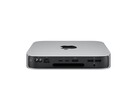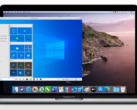After first announcing the advent of custom silicon back in June this year, Apple has finally unveiled its new SoC for upcoming Macs — the Apple M1 and no, it is not the motion co-processor found in iPhones and iPads.
The Apple M1 marks the second architecture transition of recent times. Back in 2006, Apple moved from the IBM PowerPC chips to Intel x86 and now, we see the company transitioning from Intel x86 to its own custom silicon that has hitherto proved to be extremely powerful in mobile.
At its core, the M1 is essentially a rejigged A14 Bionic tailored for Macs. While the A14 Bionic offers two higher performance (Firestorm) and four efficiency (IceSsorm) cores, a four-core GPU, and a 16-core NPU, the M1 increases these counts to an 8+8 CPU and an eight-core GPU while carrying forward the 16-core NPU.
Apart from the CPU, GPU, and NPU, the Apple M1 also combines I/O, security and other components such as storage controllers, usually present separately on the logic board, onto a single chip. All these components share a common memory architecture, which helps in reducing latency significantly.
Apple has conferred the M1 with many epithets including the "world's fastest CPU core in low-power silicon", "world's best CPU performance per watt", and the 'world's fastest integrated graphics in a personal computer". How well these promises stack up in real world usage is something that remains to be seen.
The Apple M1's strength in single-core performance looks to be chart chart-leading. We have previously reported about the MacBook Air's M1 beating even the 16-inch MacBook Pro in Geekbench — that too, with passive cooling.
Now, we are getting to also see the new 13-inch MacBook Pro work wonders in this benchmark. According to the Geekbench listing, the M1 in the 13-inch MacBook Pro manages a single-core score of 1,714 and a multi-core score of 6,802 at a base clock of 3.2 GHz.
This single-core score is about 54% faster than what is attained by the Core i9-9880H — an 8-core 16-thread 45 W CPU powering the 16-inch MacBook Pro. In multi-core, the Core i9-9880H is just about 4.5% faster than the M1. However, we have seen the M1 reaching up to 7,433 points in a passively cooled MacBook Air as well, which sort of reverses the positions.
The interesting point here is that there does not seem to be much difference between the passively cooled M1 in the MacBook Air and the actively cooled one in the 13-inch MacBook Pro and the Mac Mini (1,682, and 7,097 points). However, we do expect sustained performance to be much better with a fan compared to a fanless implementation.
Of course, this is just one test and we will surely run into more Geekbench and other benchmark scores that may give us a better idea of performance differences between both cooling scenarios. Nevertheless, these leaked Geekbench scores seem to indicate that Apple may well be right, at least with respect to raw CPU power and performance per watt.

























